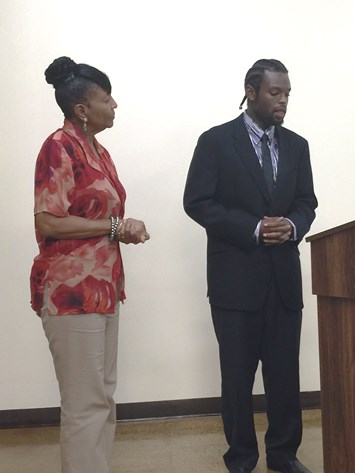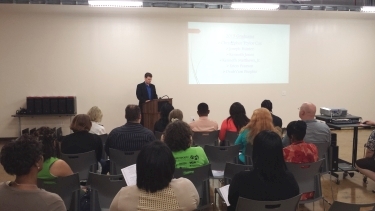
by Kelly Rogge
Six students became real college students earning their first three hours of college credit during Kansas City Kansas Community College’s 2015 Computer Camp.
The goal of the five-week camp is to give young adults the opportunity to improve their technical skills, while also getting a taste of what it is like to be in a college environment.
Students attended classes four days a week, working with different instructors in the areas of computer skills and work readiness. Courses focused on everything from learning the basics of computer hardware and software to business writing skills and how to behave in the workplace. In addition, students learned about job readiness skills such as resume building and interviewing, helping them to be prepared as they enter the workforce. The program utilized the A+ computer curriculum, providing the students with three college credit hours.
Sponsored by KCKCC’s Workforce and Career Development and Dynamic Workforce Solutions, the camp was open to youth aged 18 to 22 from Wyandotte and Johnson counties.
“The computer skills we learned here have empowered us to have a better career,” said Kenneth James, a Computer Camp participant. “With what we have learned, we will all be able to help the community.”
During the camp, students helped to prepare computers for six non-profit agencies – the Humane Society, University Methodist Church, 911 Transitional Housing, Youthbuild KCK, the Women’s Business Center Inc. and Destiny Bible Fellowship Community Church. These agencies were chosen through a Request for Proposal process in which the students helped to facilitate.
“We had the opportunity to learn the basics of how computers work,” said Erion Pearson, one of the students in the 2015 Computer Camp. “Then we worked together as a team and put our minds together to solve the problems. I think this camp helped us grow and achieve.”
Having the opportunity to interact with industry representatives and organizations was another component of the camp. Students toured Connecting for Good, a non-profit agency that repairs and distributes computers in the local community and had the opportunity to participate in mock interviews with representatives from AppleOne and Synetic Technologies. Dressed in appropriate attire provided by KCKCC’s Counseling and Advocacy Center and with resumes in hand, students went through a series of roundtable interview sessions. After the interviews, students received feedback on their performances.
“Thursday morning was their final test on all the skills learned during the work readiness portion of the camp,” said Marisa Gray, director of Workforce and Career Development at KCKCC. “It was uplifting to see the transformation of the students from the first day of class with their new found knowledge, skills and self-pride.”
In addition to giving the computers to the non-profit organizations, several students received awards during the program’s graduation event. Christopher Taylor Cox received the Most Innovative Person Award; Erin Pearson received the Work Ready Attitude award and DeahVion Peoples received the Team Minded Player Award. Students received a gift bag full of items including a tablet and a set of their own business cards.
“We are all happy to be here to celebrate your hard work,” said Susan Lindahl, chief financial officer at KCKCC. “We know that you will all go out and do great things with what you have learned, and we are excited to hear about your successes in the future.”
For more information about the Computer Technician Basic Skills Camp, contact Marisa Gray, director, workforce and career at KCKCC at [email protected] or by calling 913-288-7284.
Kelly Rogge is the public information supervisor for KCKCC.

